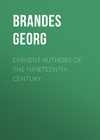Loe raamatut: «Main Currents in Nineteenth Century Literature – 3. The Reaction in France», lehekülg 8
When Schelling and Caroline had become so indispensable to each other that it was necessary to break the tie which bound her to Schlegel, the latter, with perfect chivalry, gave his consent. Writing of the divorce, Caroline says: "We broke a tie which neither of us had ever considered permanently binding."25 Her new marriage was a perfectly happy one.
The way in which Schlegel takes Caroline's decision enlightens us not only as to the theories of the Romanticists, but as to the manner in which the leaders of the school applied them in their own lives. August Wilhelm not only gives his consent, but continues to keep up a friendly correspondence with Schelling, and in literary matters the two men render each other valuable assistance. Caroline herself maintains the friendliest relations with Schlegel long after he is aware of the relation in which she stands to Schelling. She writes to him in May 1801: "Will you, please, decide a dispute between Schelling and me? Are these hexameters (Schelling's) worth anything? I consider the last lines awkward, but he maintains that they are good." Schlegel actually visited the couple at Munich, in company with Madame de Staël.
Thus even very serious personal disagreements and ruptures could not divide those whom fellowship of ideas and a common endeavour to promote them, united. The Romanticists considered personal liberty an inalienable right, and respected it in others while demanding it for themselves.
But we learn something else besides the fact that the Romanticists were very changeable in their loves, and perfectly regardless of social ties; and that something is, that their women were superior to them in everything but talent, and that what the men did was to drag them down to their own level. We see the strong-minded, energetic Dorothea, who is so keenly sensible of the pettiness of the purely literary endeavours of the Romanticists, slowly change, see her reluctantly admire Lucinde, then write novels herself in the prescribed style, and finally follow Friedrich to Vienna and become a Catholic along with him. Or look at the high-spirited, enthusiastic, resolute Caroline, who, as a young widow not much over twenty, attempts to revolutionise the Rhineland. So unflinching is she then, that she compromises herself recklessly, and risks the life and well-being of those dearest to her with absolute regardlessness. Friedrich writes to August Wilhelm: "I shall never forgive her heartlessness in being ready to beguile you, her friend, into that vortex of ignoble dangers and worthless characters." Only a few years later we see this same woman writing anonymous reviews, favourable or unfavourable, of her husband's wretched dramas, and entirely absorbed in literary intrigues. Ever and anon her spirit is momentarily stirred by a breath wafted from the old times. Then we feel how changed she is. Writing to her daughter in October 1799, after giving her a quantity of family news, the last item of which is: "Hofrath Hufeland has returned, with wife and children," she exclaims: "But what sorry trash is all this! Buonaparte is in Paris! Think of that, child! All will go well again. The Russians have been driven out of Switzerland; they and the English will be obliged to capitulate with disgrace in Holland; the French are making way in Swabia; and now comes Buonaparte. Rejoice with me, or I shall think that you are entirely taken up with frivolities and have no serious thoughts at all." Then, almost in the same breath, literary gossip: "Tieck is here and we are much together. You would never believe all that these men take it into their heads to do. I will send you a sonnet on Merkel. He has been running about Berlin, telling that the Schlegels have received a reprimand from the Duke on account of the Athenæum, &c. So Wilhelm and Tieck set to work the other evening and wrote a wicked sonnet in his honour. It was splendid to see the two pairs of brown eyes flashing at each other, and the wild merriment with which the perfectly justifiable squib was concocted. Dorothea and I almost rolled on the floor with laughter. She knows how to laugh, which will recommend her to you. Merkel is done for; he will never recover it. There will be a terrible uproar… Schelling is attacking the Allgemeine Litteraturzeitung with all his might. These quarrels, however, are of no importance to you; but Buonaparte and the Russians most certainly are." It is as though she strove to keep the larger interests alive in her daughter, feeling that they were dying in herself. Soon she marries Schelling, and conforms to all the established conventions of that great clerical stronghold, Bavaria.
Many great men have vainly attempted to teach the women they loved to share their interests. To my mind no worse accusation can be brought against gifted men, no surer sign of their weakness adduced than this, that, far from raising the women who have given themselves to them and followed them, they have dragged them down, taken from them their highest interests and noblest sympathies, and given them small and mean ones in exchange. From such a charge the Romanticists cannot free themselves. They treated the great women given them by the gods as they did the great ideas which were their own heritage; they took from them the noble, liberal-minded social and political enthusiasm by which they were naturally characterised, and made them, first Romantic and literary, then remorseful, and finally Catholic.
VIII
SCHLEIERMACHER'S LETTERS
The Romanticists themselves were by no means satisfied with Lucinde. Novalis has most to say in its favour. He is of opinion that there are few such personal books; it seems to him that in it all the workings of the author's mind may be observed as distinctly as the play of chemical forces during the dissolution of a lump of sugar in a glass of water. He is somewhat disturbed by the species of delusion prevailing throughout the work, which makes man, the thinking being, a mere natural force, and which takes such possession of the reader that he finds himself deeply interested in what is simply sensual instinct. Moreover, the whole is not simple enough, not sufficiently free from pedantry. Yet "Romantic chords" are not lacking, and it is not so much the matter as the form to which he objects.
He writes at once to Caroline Schlegel: "There is nothing to object to in the ideas, but in the manner of expressing them there is a good deal which strikes me as being borrowed from Krates [the cynic]. The cry, 'Be cynical!' is not yet heard among us, and even really advanced women will blame the beautiful Athenian for having made the market-place her bridal chamber."
Quite true; only it was not the luckless Dorothea who was to blame for the profanation, even though she did not feel incensed by the public exhibition, as we do on her behalf; her lord and master was alone to blame.
We have seen that Caroline soon allowed her satirical wit free play in writing of Lucinde; and A. W. Schlegel, Schelling, Steffens, and the others privately regarded it as an enfant terrible, whatever their public utterances may have been. A. W. Schlegel indeed wrote, in a sonnet to Friedrich: —
"Dich führt zur Dichtung Andacht brünst'ger Liebe,
Du willst zum Tempel dir das Leben bilden,
Wo Götterrecht die Freiheit lös' und binde.
Und dass ohn' Opfer der Altar nicht bliebe,
Entführtest Du den himmlischen Gefilden,
Die hohe Gluth der leuchtenden Lucinde."26
And when Kotzebue published the comedy, Der hyperboräische Esel, which satirises Friedrich and his book, August Wilhelm responded with the witty satire, Ehrenpforte für den Präsidenten von Kotzebue; but privately he called the book a "foolish rhapsody." Tieck called it "eine wunderliche Chimäre," and even Schleiermacher attempted to disavow his authorship of the Letters on the Subject of Lucinde, after his inclination to a species of sensual mysticism had given place to a Protestant-rationalistic tendency. Nevertheless, or rather, for this very reason, it is of importance that we should inquire into the nature of these letters, which were written with the aim of proving Lucinde to be, not merely an innocent, but a good and holy book, the worth of which is testified to by the delight which high-minded women take in it. On the letters of two such women, his sister, Ernestine, and his friend, Eleonore Grunow, Schleiermacher's own are based.
There is little of general interest for us nowadays in these letters, so we shall only notice their salient points. As Lucinde is the solitary contribution of Romanticism towards the solution of a social problem, and as marriage is almost the only social question grappled with by literature generally at the beginning of the century (Goethe's Wanderjahre alone, in the manner of Rousseau's romances, occupying itself with a wider range of such questions), it will be of interest to compare the utterances of the different European literatures on this subject.
Schleiermacher's book is an attack upon prudery. At the very beginning he writes: "I was almost inclined to believe that you had become a prude; if you had, I should have entreated you to go and settle in England, to which country I should like to banish the whole genus." And one division of the book is entirely devoted to an analysis of that false modesty which precludes true modesty, and causes so much unnecessary misery.
"The anxious and narrow-minded modesty by which society at the present day is characterised, has its root in the consciousness of a great and general wrongheadedness and depravity. But where is it to end? It is bound to spread farther and farther. If people are perpetually on the lookout for what is immodest, they will end by discovering it in every domain of thought, and all conversation and social intercourse must cease… utter depravation and the perfect education by which man returns to innocence, both do away with modesty; in the first case true modesty, as well as false, is destroyed; in the second, it ceases to be a thing to which much attention is paid or much importance attached.27
"Is it not the case, dear child, that everything spiritual in man has its beginning in an instinctive, vague, inward impulse, which only the action of the individual, frequently repeated, develops into definite, conscious will and a perfected faculty. Not until they have developed so far can there be any question of a lasting connection between these inward impulses and definite objects. Why should love be different from everything else? Is it reasonable to expect the highest faculty of man to be perfect from the first? Should it be easier to love than to eat and drink? Surely in love too there must be preparatory attempts, from which nothing permanent results, but which all tend to make the feeling more distinct and more noble. The connection of these attempts with any definite object is merely accidental, at first often purely imaginary, and always ephemeral – as ephemeral as the feeling itself, which soon gives place to one more clearly defined and intense. Inquire of the most mature and highly cultivated men and women; you will find that they smile at the thought of their first love as at any other laughable childish performance, and often live in complete indifference side by side with the object of it. According to the nature of things it must be so, and to insist upon faithfulness and a lasting connection is as dangerous as it is foolish."
Schleiermacher naturally warns his correspondent against what he calls the chimera of the holiness of first love: "Do not believe that everything depends upon something coming of it. The novels which support this idea, and make love between the same two beings develop uninterruptedly from its first raw beginning to its highest perfection, are as hurtful as they are silly; and their authors, as a rule, have as little understanding of love as they have of art… When the more or less indefinite love longing settles upon a definite object, there necessarily arises a definite connection, and a point of closest approach. When this point has been reached and you feel that it is not the right one, not one that can be held, what is there left for you to do but to part again? Only after such an attempt has been completed as an attempt, that is to say, after the connection has been broken off, can the memory of it and reflection upon it produce a truer understanding of the longing and feeling, and thus prepare for another and better attempt. Is there any obligation to make the next with the same person? Upon what can such an obligation be founded? I, for my part, consider this more unnatural than love between brother and sister. Allow yourself perfect liberty, then; endeavouring only to preserve a pure-minded, clear feeling that it is merely an experiment, so that you may be prevented from sanctioning and perpetuating that which is not intended to be more, by that self-surrender which, from its nature, ought to mark the end of experiments and the beginning of a true and lasting love. Such a mistake, which is both the consequence and the cause of the most miserable delusions, you must regard as the most terrible thing that can happen to you; I would have you understand that this is in reality allowing one's self to be seduced. When you have found true love, and feel yourself to have reached the point at which you can perfect your character and make your life beautiful and worthy, diffidence and fear of the last and most precious seal of union will seem to you pure affectation. The only danger lies in the fact that every attempt, from its very nature, aims at reaching this point. The point of sufficiency can only be discovered by satiety. But if you are healthy in mind and heart, you will, as often as one of these attempts to love approaches this point, feel an aversion which is something far higher and holier than any law, or than what generally goes by the name of modesty and chastity."
Sound and sensible reflections, one and all, but neither exhaustive nor applicable to what are the real difficulties of the case. Schleiermacher warns against mistakes, but cannot remedy them, without infringing upon the sanctity of marriage, which he never calls in question. For what is to be done when the mistake has already been made? And what when it has been on one side only, when only the love of the one has grown cold, while that of the other still endures? And he does not give a word or a thought to the fact that marriage, as a social institution, does not exist for the sake of the lovers, that its original intention was to secure the father's property for the children, and that it has continued to exist because it seemed to society the only means of protecting the rising generation. Schleiermacher, the idealist, would fain discover a new moral foundation, and entirely overlooks the real, the practical difficulties. How characteristic of the nation to which the author belongs is all this pondering over feeling! An Italian once said to me: "What astonishes us most in the emotional life of the Teutonic nations is their conception and cult of love. With them love is positively a religion, something in which a good man is bound to believe. And this religion has its theology, and its philosophy, and what not. We simply love, and no more about it." I thought of this speech when reading Schleiermacher. How much ingenuity he exhibits in proving that men should not allow themselves to be disturbed by false theories when they love, and what a steadfast belief in the love which is to "complete and perfect the character," lies at the foundation of it all! It is instructive to compare with Schleiermacher's some utterances by great authors of other nations on the same subject; they throw what is peculiarly national in his into more marked relief.
George Sand, whose first novels are the expression of the same movement in France which Lucinde inaugurates in Germany, says, by the mouth of the principal characters in Jacques and Lucrezia Floriani: "Paul and Virginia were able to love each other steadily and undisturbedly; for they were children brought up by the same mother. Our surroundings have been too utterly unlike… If two beings are to understand each other always, and to be united by an unchangeable love, their characters as children must have been formed by a similar education, they must have the same beliefs, the same turn of mind, even the same manners and habits. But we, the distressed offspring of a turbulent and corrupt society, which behaves to her disunited children like a stepmother, and is more cruel in her periods of savagery than actual savages are, how can we wonder, after such great outward divisions, at the perpetual divisions of hearts and the impossibility of inward harmony."
Obviously George Sand is considerably less persuaded than Schleiermacher of the probability or possibility of the individual's meeting with that "right one," love for whom perfects. Jacques says: "I am still persuaded that marriage is one of the most barbarous institutions of society. I doubt not that it will be abolished when the human race makes further progress towards justice and reason; a more human and not less sacred tie will take its place and will ensure the well-being of the children without fettering the freedom of the parents. But as yet men are too barbarous and women too cowardly to demand a nobler law than the iron one by which they are now ruled. Beings destitute of conscience and virtue need heavy chains. The improvements of which some generous spirits dream, cannot be realised in such an age as ours; these spirits forget that they are a hundred years in advance of their contemporaries, and that before they change the law, they must change mankind." Jacques says to his bride on their wedding day: "Society is about to dictate an oath to you. You are about to swear to be faithful and obedient to me, that is to say, never to love any one but me, and to obey me in all things. One of these vows is an absurdity, the other a disgrace."
The idea expressed by George Sand in all these books is, that to preserve the outward semblance of love, by caresses, &c., after it has ceased to exist, is what constitutes real immorality in love. Jacques says: "I have never forced my imagination to rekindle or reanimate a feeling in my soul which I no longer found there. I have never looked upon love as a duty, constancy as a rôle. When I have felt that love was extinguished in my soul I have said so, without being either ashamed or conscience-stricken." And Lucrezia Floriani says, still more emphatically: "Not one of all the passions to which I have yielded naively and blindly, seemed to me so guilty as the one which I was endeavouring, contrary to my feeling, to make lasting."
The French authoress looks upon unchangeable love for one and the same person as a possibility only, dependent upon certain conditions; and her idea of love is not, like Schleiermacher's, that it is the highest educational force, but that, as an irresistible natural force, a possessing passion, it is beautiful, the most beautiful thing in life. Institutions must adapt themselves to it, since it cannot change its nature to suit institutions. A disciple of Rousseau, she champions the cause of nature.
Let us now glance at one of the works of a contemporary English writer of the same tendencies, at Shelley's Queen Mab. In the notes he has appended to this poem we come upon a third variation of the opposition to prevailing opinions. Shelley says: "Love is inevitably consequent upon the perception of loveliness. Love withers under constraint: its very essence is liberty: it is compatible neither with obedience, jealousy, nor fear: it is there most pure, perfect, and unlimited, where its votaries live in confidence, equality, and unreserve… A husband and wife ought to continue so long united as they love each other: any law which should bind them to cohabitation for one moment after the decay of their affection would be a most intolerable tyranny, and the most unworthy of toleration. How odious an usurpation of the right of private judgment should that law be considered which should make the ties of friendship indissoluble, in spite of the caprices, the inconstancy, the fallibility, and capacity for improvement of the human mind. And by so much would the fetters of love be heavier and more unendurable than those of friendship, as love is more vehement and capricious, more dependent on those delicate peculiarities of imagination, and less capable of reduction to the ostensible merits of the object… Love is free: to promise for ever to love the same woman is not less absurd than to promise to believe the same creed… The present system of constraint does no more, in the majority of instances, than make hypocrites or open enemies. Persons of delicacy and virtue, unhappily united to one whom they find it impossible to love, spend the loveliest season of their life in unproductive efforts to appear otherwise than they are, for the sake of the feelings of their partner or the welfare of their mutual offspring: those of less generosity and refinement openly avow their disappointment, and linger out the remnant of that union, which only death can dissolve, in a state of incurable bickering and hostility. The early education of their children takes its colour from the squabbles of the parents; they are nursed in a systematic school of ill-humour, violence, and falsehood… The conviction that wedlock is indissoluble holds out the strongest of all temptations to the perverse: they indulge without restraint in acrimony, and all the little tyrannies of domestic life, when they know that their victim is without appeal… Prostitution is the legitimate offspring of marriage and its accompanying errors. Women, for no other crime than having followed the dictates of a natural appetite, are driven with fury from the comforts and sympathies of society. It is less venial than murder… Has a woman obeyed the instincts of unerring nature (sic!), society declares war against her, pitiless and eternal war: she must be the tame slave, she must make no reprisals; theirs is the right of persecution, hers the duty of endurance. She lives a life of infamy: the loud and bitter laugh of scorn scares her from all return. She dies of long and lingering disease: yet she is in fault, she is the criminal, and society the pure and virtuous matron, who casts her as an abortion from her undefiled bosom!.. Young men, excluded by the fanatical idea of chastity from the society of modest and accomplished women, associate with these vicious and miserable beings… Chastity is a monkish and evangelical superstition, a greater foe to natural temperance even than unintellectual sensuality; it strikes at the root of all domestic happiness, and consigns more than half of the human race to misery, that some few may monopolise according to law. A system could not well have been devised more studiously hostile to human happiness than marriage. I conceive that from the abolition of marriage the fit and natural arrangement of sexual intercourse would result. I by no means assert that the intercourse would be promiscuous: on the contrary, it appears, from the relation of parent to child, that this union is generally of long duration, and marked above all others with generosity and self-devotion… In fact, religion and morality, as they now stand, compose a practical code of misery and servitude: the genius of human happiness must tear every leaf from the accursed book of God ere man can read the inscription on his heart. How would morality, dressed up in stiff stays and finery, start from her own disgusting image, should she look in the mirror of nature!"
Here again we have appeals to nature; but the standpoint is an entirely different one. Shelley, the enthusiastic atheist, attributes the principal miseries of social humanity to traditional religion. "Unerring" nature is the divinity he substitutes for the God of the Bible. He considers that man has the right to demand happiness, and, like a true Englishman, contends, without troubling much about the psychology of the matter, for the freedom of the individual from the compulsion of external law. Schleiermacher warns against what is foolish, because, once the foolish step is taken, it is binding; but he, the Protestant pastor, only indirectly incites to revolt. George Sand rebels against what is dishonourable. In the ethical creed of the French authoress honour plays the same part that wisdom does in Schleiermacher's; it is by the mouth of Jacques, her ideal of manly honour, that she protests in the name of the honour of humanity. Shelley stands forth as the champion of personal liberty; it is thraldom that he desires to abolish. The English apostle of liberty, soon to be an exile, unhesitatingly attacks the institutions of society. George Sand never directly attacked marriage. She actually says in the introduction to Mauprat: "It is husbands I have attacked, and if I am asked what I propose to substitute for them, I answer – marriage." But Shelley, who takes cognisance of all evils from the social and political standpoint, proposes to improve humanity by legislation, being persuaded that the state is bound to secure as much liberty of action as possible to the individual as citizen.
It is obvious that, of these three representatives of the same idea, Schleiermacher is the most profound thinker and the most reserved. In his estimation character is of the first importance, in George Sand's, the heart, and in Shelley's, happiness. These three great writers are the spokesmen of three great nations, and by comparing them we are better able to understand the character of the whole movement which begins at the beginning of the century, but which can neither settle into shape nor produce good and tranquillising results until the intellectual and social emancipation of woman has advanced so far that she is independent of social prejudices, knows her own needs, and is in a position to supply them.

















